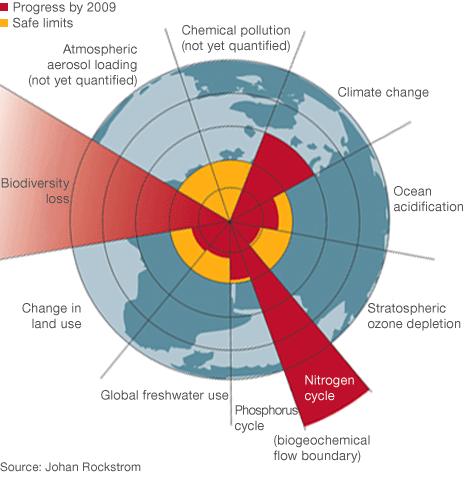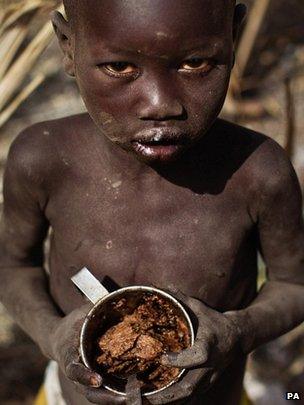Population and consumption key to future, report says
- Published

Consumption levels are now high enough in some developing countries as to become a concern
Over-consumption in rich countries and rapid population growth in the poorest both need to be tackled to put society on a sustainable path, a report says.
An expert group convened by the <link> <caption>Royal Society</caption> <url href="http://royalsociety.org/" platform="highweb"/> </link> spent nearly two years reading evidence and writing their report.
Firm recommendations include giving all women access to family planning, moving beyond GDP as the yardstick of economic health and reducing food waste.
The report will feed into preparations for the Rio+20 summit in June.
"This is an absolutely critical period for people and the planet, with profound changes for human health and wellbeing and the natural environment," said Sir John Sulston, the report's chairman.
"Where we go is down to human volition - it's not pre-ordained, it's not the act of anything outside humanity, it's in our hands."
Sir John came to fame through heading the UK part of the Human Genome Project.
He shared the 2002 Nobel Prize for Physiology or Medicine, and now chairs the Institute for Science Ethics and Innovation at Manchester University.
Back on the table
Although the size of the Earth's human population used to be a main ingredient of environmental debate, it has fallen off the table in recent years.
In part that was because the Earth appeared able to support more people than predictions had suggested, and partly because developing countries came to view the population issue as a smokescreen to hide Western over-consumption.
However it is now back on the table, largely because of research showing that women in the poorest nations generally want access to family planning and that people benefit from it.
The UN's "medium" projection indicates the population peaking at just over 10 billion before the end of the century, and then starting to fall, from a current level of seven billion.

Human expansion is among the factors threatening bees, whose worth is not captured by GDP
"Of the three billion extra people we expect to have, most will come from the least developed countries, and the population of Africa alone will increase by two billion," said Eliya Zulu, executive director of the African Institute for Development Policy based in Nairobi.
"We have to invest in family planning in these countries - we empower women, increase child and maternal health and provide a greater opportunity for the poorest countries to invest in education."
The report recommends that developed nations support universal access to family planning, which it estimates would cost $6bn per year.
If the fertility rate in the least developed countries does not come down to levels seen in the rest of the world, it warns, the year 2100 could see a global population of 22bn of whom 17bn would be Africans.
Exceeding the planet's boundaries

The report backs the notion that humanity has already moved beyond "safe" planetary boundaries on biodiversity loss, climate change and the nitrogen cycle, risking severe impacts in the future
As well as supporting family planning and universal education, the Royal Society says a priority must be to lift the poorest 1.3bn people in the world out of extreme poverty.
If this means increased consumption of food, water and other resources, the experts conclude, that is simply the right thing to do.
Meanwhile they say that the richest must cut back on the material resources they consume - though that might not affect living standards.
Eliminating food waste, slashing fossil fuel burning and switching economies from goods to services are among the simple measures advocated to reduce the developed world's footprint without reducing the prosperity of its citizens.
"A child in the developed world consumes 30-50 times as much water as in the developing world; CO2 production, a proxy of energy use, can also be 50 times higher," noted Sir John.
"We cannot conceive of a world that is going to carry on being as unequal as it is, or even become more unequal."

Untrammelled population growth is contributing to severe poverty, the report says
A number of developing and middle income countries are beginning to feel the same impacts of over-consumption as in the west, such as obesity.
Fundamentally, use of GDP as virtually the sole indicator of an economy's health needs to end, says the Royal Society, with other measures adopted that value "natural capital", the goods and services that nature provides for free.
"We have to go beyond GDP; and either we can do it voluntarily or we'll have to do it because pressure on a finite planet will in the end make us," said Jules Pretty, professor of environment and society at the University of Essex.
"The environment is the economy to some extent... and you can talk about running economies in ways that improve peoples' lives but don't damage natural capital, that even enhance it."
The Rio+20 summit in June is likely to agree on establishing a set of "sustainable development goals" (SDGs) to follow on from the existing Millennium Development Goals (MDGs) that are helping to reduce poverty and improve health and education in developing countries.
Whether the SDGs will commit rich countries to curbing consumption is currently unclear.
Governments may also agree in Rio to develop and use economic indicators other than GDP.
Follow Richard <link> <caption>on Twitter</caption> <url href="http://twitter.com/#!/BBCRBlack" platform="highweb"/> </link>
- Published26 March 2012
- Published28 March 2012
- Published12 March 2012
- Published12 May 2011